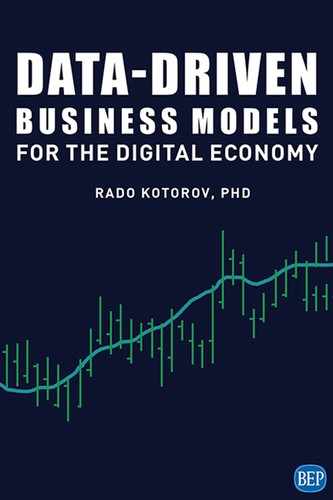Those who spout on about data being the “new oil” are only at the cusp of realizing data’s potential, and I find typically are on the outside looking in at those thriving as part of the Information Age and digital economy. When I first met Rado Kotorov a decade ago he was clearly not one of these individuals. We got to talking about the variety of unique economic attributes of information and how it was incumbent upon business leaders to capitalize on them.
Yet even celebrated business leaders sometimes at first fail to understand information’s value proposition. In 1996 at the outset of the Internet’s Cambrian explosion Steve Jobs remarked, “I don’t see most people using the Web to get more information. We’re already in information overload.” This attitude of information as an annoyance, or at best a nice-to-have resource, has been the death of thousands of companies. The contrarian view of information as a true economic asset, however, has birthed new businesses, business models, digital products and services, and overall marketplaces.
Today these businesses and business models are all around us, at home, at play, at work, and everywhere in between. Taking advantage of them as a consumer is as easy as opening a browser or picking up a smartphone and downloading an app. But taking advantage of them as a business model has proven challenging for many business leaders. Indeed, status quo business processes, methods, and even legacy technologies can inhibit a business from expediently becoming data driven or offering digital solutions. But as Dr. Kotorov points out, it’s more about an inability to recognize information as an actual economic asset, to appreciate its unique economic properties, and to change one’s mindset. Easier said than done.
Thankfully “Data-Driven Business Models for the Digital Economy” weaves inspirational stories and a roadmap to innovating with information. The first key lesson is to recognize that you don’t need physical assets to create equity. My own research into the economics of information (or “infonomics”) revealed how investors favor data-savvy businesses with a market-to-book valuations nearly three times higher than traditional businesses. His book goes further to describe how to cannibalize traditional business models, how to “scale and scope” with data, how to introduce data as a product/service, and how to develop digital supplements, and the importance of self-service enablement today.
The earliest known mention of “business intelligence” in Richard Devens and Sinclair Hamilton’s 1865 book, “The Cyclopaedia of Commercial and Business Anecdotes,” recounts how information about military battles was collected and sold to King William. Today, just as then, information moves markets. But today information has created new markets, new products, new services, and new business models. Data monetization isn’t just about selling data, it’s about using data to generate all manner of economic benefits. Doubtless new types of benefits already are being conceived by tomorrow’s datapreneurs. And for those who have been wondering how to join them, this book is just the guide they have been craving.
Dr. Kotorov’s wealth of experience and fresh thinking come through loud and clear and may be just the smack upside the head or kick in the seat of the pants that many business leaders need to lead their organizations to become truly data driven.
Douglas Laney,
Author of Infonomics: How to Monetize,
Manage, and Measure Information as an Asset for
Competitive Advantage, Principal Data Strategist, Caserta
Adjunct Professor, University of Illinois Gies School of Business
Three-time Gartner annual Thought Leadership Award recipient
